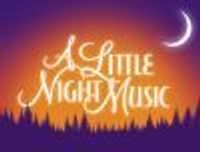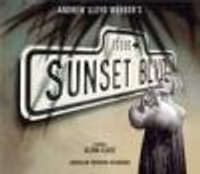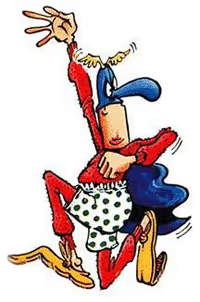Bad Lyrics
Emmaloucbway
Broadway Legend Joined: 10/16/11
#75Bad Lyrics
Posted: 11/10/11 at 10:48pmI really hate a lot of the lyrics for the added songs in the Little Mermaid stage version. They are so... cringe-worthy.
#76Bad Lyrics
Posted: 11/10/11 at 11:36pm
Exactly. I can freely accept that in Camelot Winter DOES exit on the *second* of March and not some less whimsical but more standard date like the first of March. *shrug*
Actually, while I'm not a huge fan of many Waltz lyrics (nor do I think they're bad--Sondheim has mentioned how some songs musically are inspired and others simply drag--and I think his lyrics do help save a few songs, somewhat), but if we're discussing roses anyway why shouldn't it pop into her head that they're dancing with peonies? Would "some random flower is dancing with another random flower" or roses are dancing with other flowers make a better lyric (rhyme aside?)
Gaveston2
Broadway Legend Joined: 6/28/11
#77Bad Lyrics
Posted: 11/11/11 at 12:55am
I'll bow to Eric's superior knowledge of the WALTZ score. I know the piece mostly from the published libretto and the lyrics just seem appallingly boring. Maybe they are better when paired with Rodgers' music.
But I do think musical theater in general demands a certain willingness from the viewer to surrender to whimsy and lyrical surprises. I often find Sondheim's criticisms far too literal. I think we all understand that Frank Butler is singing he'll be present at his wedding ("She'll wear a gardenia and I'll be there."), not that he'll actually be in the hair of his bride.
I've already defending Hammerstein's use of "intelligent and smart" and I've said Nellie's "bromidic" doesn't bother me. The more important point is that thousands of theatergoers have enjoyed SOUTH PACIFIC without tripping over either lyric.
So there, After Eight. I have disagreed with Sondheim's critical opinions (and in other threads I have mentions moments where his lyrics are substandard). I hope that make you happy.
#78Bad Lyrics
Posted: 11/11/11 at 2:19am
Waltz really has some gems--and then some dreadful songs. Only recently have I started to somewhat appreciate it (I do think Sondheim is far far too hard on it, probably partly reflectivng what a miserable writing experience it was).
I definitely think Sondheim is too literal on many of his criticisms of other lyricists--as well as himself.
We discussed (to death) in that other thread; lyrics of his, people may not like, but to pick an obvious example, I think his criticisms of I Feel Pretty sounding like Maria is someone out of a Noel Coward play is a bit much. Sure, I get his point (and I wish he would have published in Finishing the Hat the simpler lyrics he said he submitted during rehearsals but were refused), but I don't find it that hard to suspend belief. As a friend who works teaching English to ESL students mentioned when she heard his criticsm, many fo the people she knew who spoke English as a second language were obsessed with coming up with clever word play, puns, and paid attention to things like rhymes more than many native speakers she knew.
*coff* anyway I do hear lyrics that bother me because there's an awkward, or obscure, or redundant word that's obviously there to serve a rhyme--but I wouldn't call picking a specific flower to dance with roses, or a specific date for the chaning of seasons in Camelot, to be one of them.
After Eight
Broadway Legend Joined: 6/5/09
#79Bad Lyrics
Posted: 11/11/11 at 5:44am
Mmm, I don't think you got my point, Eric.
"*coff* anyway I do hear lyrics that bother me because there's an awkward, or obscure, or redundant word that's obviously there to serve a rhyme--but I wouldn't call picking a specific flower to dance with roses, or a specific date for the chaning of seasons in Camelot, to be one of them."
Could you perhaps then offer an example of such lyrics that do bother you?
#80Bad Lyrics
Posted: 11/11/11 at 6:12amLOL I'll have to get back to you--though I know Tim Rice does it a lot. Sorry, I know my point isn't worth much without examples--will come up with something :P But I still must disagree with your examples :P
Gaveston2
Broadway Legend Joined: 6/28/11
#81Bad Lyrics
Posted: 11/11/11 at 6:24pm
I'm sorry to agree with you again, Eric, but I think it's quite possible to see Sondheim's point about Maria's diction and still not be bothered by the number in performance. One suspends all sorts of disbeliefs in any musical.
Stand-up comic Bobby Slater does a joke about Tony wandering through a Puerto Rican neighborhood shouting "Maria!": "How come only one woman comes to the window?"
The idea that characters should sing lyrics that are close to how they would speak in real life is Hammerstein's great contribution to the American musical and, as much as anything, defines the "musical play."
But I don't think it was ever the rule in musical comedy. Ethel Merman sang Cole Porter's witty lyrics for decades, even while the characters she played described themselves as merely average in intelligence. (And isn't that the entire joke of CALL ME MADAM? Average American Josephine stumbles into fixing Europe. Yet look at the intricacies of the lyrics to "Hostess with the Mostes'".)
Has Sondheim ever said why "I Feel Pretty" is a problem, but "Gee, Officer Krupke" isn't? (Other than the obvious: Sheldon Harnick criticized "Pretty".) The comic urban dialect of the latter is just as artificial as anything in the former.
Perhaps the real problem for both Sondheim and Harnick is just that Maria doesn't sing complicated internal rhymes anywhere else in the score.
#82Bad Lyrics
Posted: 11/11/11 at 6:32pmThat is the problem, actually. Sondheim says Maria is a teenage girl who recently moved to New York from Puerto Rico and he has her sounding like a poet.
Gaveston2
Broadway Legend Joined: 6/28/11
#83Bad Lyrics
Posted: 11/11/11 at 6:40pm
Good point about the recent move, Cheno.
But one might ask why we should assume any of the characters in that scene are actually speaking English? Maybe the characters are joking around in Spanish, but the actors are speaking English so the audience can understand (just as I assume the actors spoke Japanese when the show was done in Tokyo).
And honestly, do Tony or Maria ever sound like real teenagers at any point in the show?
We know that Laurents invented the teenage slang employed by the characters because real slang would become dated too quickly. And it seems he is universally praised for that bit of artifice. IMO it was a very smart choice.
So why is realism the rule all of a sudden in the millinery shop? (Except that, again, Harnick bitched about it.)
#84Bad Lyrics
Posted: 11/11/11 at 6:43pmI don't have a problem with it. I love I Feel Pretty but that was what Sondheim said in an interview.
Gaveston2
Broadway Legend Joined: 6/28/11
#85Bad Lyrics
Posted: 11/11/11 at 6:59pm
I'm sorry, Cheno, I was just thinking out loud. Now I realize it looks like I was arguing with you.
I appreciate being reminded more precisely of Sondheim's complaint. The rest of my post was me debating Sondheim, not you.
#86Bad Lyrics
Posted: 11/13/11 at 1:29amI think "Lily's Eyes" from The Secret Garden is one of my favorite shows, but when Archibald sings "My lady fair was she..." it always throws me off a little bit.
#87Bad Lyrics
Posted: 1/16/12 at 11:46pm
Jesus Christ Superstar:
Everytime I look at you I don't understand
Why you chose such a backward time
And such a strange land.
Huh?
Jesus is the Jewish messiah, according to Christian tradition and the plot of the show, whose coming is foretold by the Old Testament prophets. And it was prophesied that he would be from the royal house of Israel. Where but "Israel 2 B.C." should he have chosen? Where else could he have chosen?
Updated On: 1/16/12 at 11:46 PM
AEA AGMA SM
Broadway Legend Joined: 8/13/09
#88Bad Lyrics
Posted: 1/17/12 at 12:33am
"Where but "Israel 2 B.C." should he have chosen? Where else could he have chosen?"
Judas answers your questions immediately after.
"If you'd come today you would have reached a whole nation.
Israel in 4 B.C. had no mass communication."
#89Bad Lyrics
Posted: 1/17/12 at 1:27pm
Glinda,
Just wondering what it is about this lyric you (or anyone else who cares to share their opinion) don't like?
#90Bad Lyrics
Posted: 8/27/12 at 2:45pm
"The President of the United States is Caroline, our maid"
The kids like twelve. He knows who the president really is...
#91Bad Lyrics
Posted: 8/27/12 at 2:47pm
Every William Finn song sounds like it was written in 3 minutes.
I tend to agree. I cringe at times at how amazing some people call things of his that I just can't seen him taking more than just a few minutes to create it.
#92Bad Lyrics
Posted: 8/27/12 at 3:05pm
"The President of the United States is Caroline, our maid"
That's not the lyric.
LegallyBroadway2
Broadway Star Joined: 8/19/10
#94Bad Lyrics
Posted: 8/27/12 at 3:16pm
Caroline! Caroline! Caroline!
the President of the United States,
Caroline whos always mad!
Okay...it's still not a great lyric.
#95Bad Lyrics
Posted: 8/27/12 at 3:32pm
I cringe that people think William Finn songs sound like they were written in 3 minutes. Perhaps it's the orchestrations they mean? I find him to be one of the most sophisticated and poignant composers in musical theatre. Whether it took him 3 minutes or 3 years, I think he's freaking genius and has created some of the most emotionally resonant and effective songs I've heard:
Set Those Sails
I Wear a Hat
The Games I Play
I Never Wanted to Love You
Father to Son
What More Can I Say
Holding to the Ground
Days Like This
Unlikely Lovers
What Would I Do?
Heart and Music
Sailing
And They're Off
The Music Still Plays On
I Feel So Much Spring
Infinite Joy
When the Earth Stopped Turning
Goodbye (from Elegies)
The I Love You Song
#96Bad Lyrics
Posted: 8/27/12 at 3:42pm
I agree 110% Matt.
His style is quirky and unique. His lyrics with their odd phrasing and unusual wordplay define his characters better than 10 pages of dialogue.
I have never felt like I "knew" a character better than Marvin.
#97Bad Lyrics
Posted: 8/27/12 at 3:58pm
I have never felt like I "knew" a character better than Marvin.
Aww, you're so sweet! Remind me to thank you with a woman warrior largess.
Vita, dulcedo, et spes nostra
Salve, Salve Regina
Ad te clamamus exsules filii Eva
Ad te suspiramus, gementes et flentes
O clemens O pia
#98Bad Lyrics
Posted: 8/27/12 at 8:54pm(Deleted because I wrote the opposite a year or so ago on page 1. These threads that live for ever make me crazy. How can I be expected to hold a consistent opinion over a period of years or even months?) Updated On: 8/27/12 at 08:54 PM
#99Bad Lyrics
Posted: 8/27/12 at 10:32pm
"That is the problem, actually. Sondheim says Maria is a teenage girl who recently moved to New York from Puerto Rico and he has her sounding like a poet."
i'm a little unclear.
1) West Side Story is a modern retelling of R&J.
2) Maria = Juliet.
3) Juliet is a teenage girl. As is Maria.
4) Juliet sounds like a poet, which, rather than being a source of complaint, has been a source of immense pleasure to the entire world for the last 500 years.
5) Maria also sounds like a poet.
6) Maria would be a poor modern version of Juliet if she didn't sound like a poet.
Or is the objection, perhaps - and I don't mean to be snarky - that young Puerto Ricans (whether in Puerto Rico or recently arrived in New York) can't be poetic? If that's not what you're implying, a) I apologize for my question, but b) what is it exactly that you are implying?
If it is what you are implying, perhaps you need to take a look at that.
Or is the objection that Puerto Rican girls can't sound like poets?
Updated On: 8/27/12 at 10:32 PM
Videos











